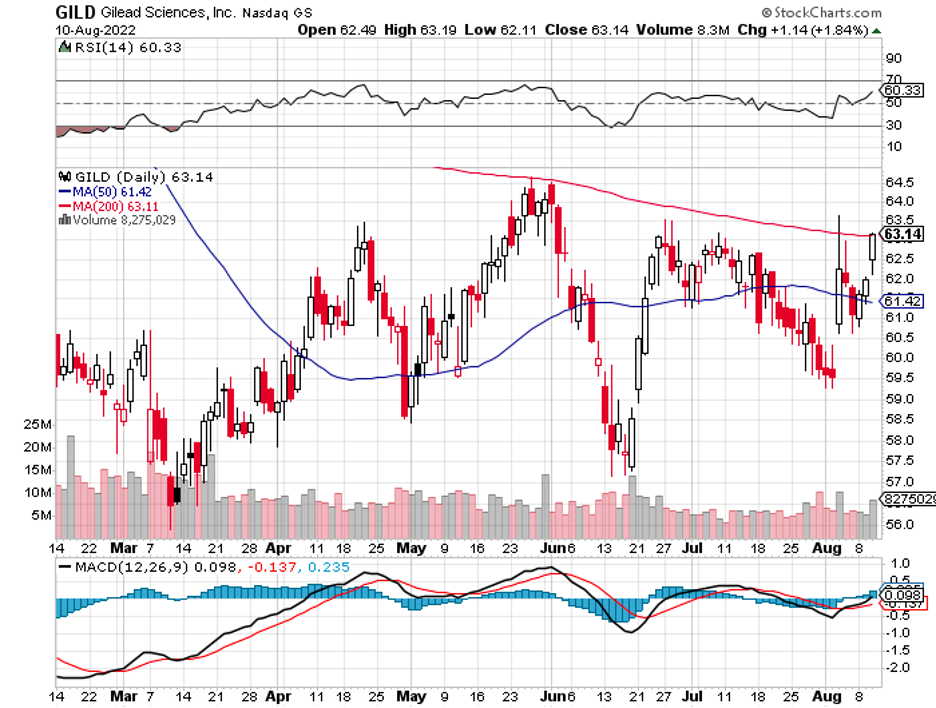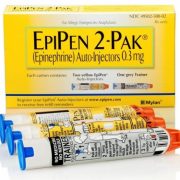Building A Recession-Proof Portfolio
In my biotechnology and healthcare newsletter earlier this week, I talked about Amgen (AMGN) and how critical it is to determine recession-proof businesses.
In the next quarters and even years, it will no longer be as vital to identify companies that can bring high growth returns in the short term.
Instead, what’s more important is to find stocks that can withstand any bear market and a recession.
Like Amgen, Gilead Sciences (GILD) also performed better than the S&P 500 (SPY) and the Nasdaq 100 (QQQ) in the past 12 months.
Considering that we are anticipating a steep recession and a potentially brutal bear market in the following quarters, Gilead Sciences is presenting itself as a solid pick.
Some refer to Gilead Sciences as a one-trick pony, but that’s not an opinion I agree with despite the company’s over-reliance on its HIV programs and antiviral treatments.
For perspective, its antiviral portfolio comprises more than 90% of the company’s 2021 revenues while its top-selling products that year are all from its HIV segment.
Although Gilead Sciences has been expanding its portfolio, the company’s HIV program remains its best moneymaker. In the second quarter of 2022, sales of its HIV treatments have risen by 7% year-over-year.
Demand for treatments in this space has climbed in the past months, which allows for more room for growth in the foreseeable future.
Among the HIV treatments, Biktarvy is the best-selling product. It’s also the treatment that continues to gain a bigger market share.
By the second quarter of 2022, Biktarvy has been reported to claim roughly 44% of the market share in the US, marking a 4% increase year-over-year.
Meanwhile, another potential blockbuster is Lenacapavir. This is a new product, which will be marketed as a long-acting injectable HIV treatment once it gains FDA approval. If this gets the green light, this could rake in an estimated $2 billion in the first year of its release.
Aside from its HIV treatments, Gilead Science’s hepatitis franchise has also been steadily growing.
Amid the competition against the likes of Abbvie’s (ABBV) Mavyret, the company’s combo treatments with Sofosbuvir continue to generate significant cash flows and promising sales.
However, this segment raked in $1.9 billion in sales, down 9% year-over-year. The decline could be attributed to the effects of the pandemic.
Nevertheless, Gilead Sciences have been working on updating this particular program and adding newer treatments to deliver better results.
Another segment that saw a spike in 2021 is the antiviral program, primarily due to Veklury or Remdesivir.
When COVID-19 broke, Veklury was hailed as the first-in-line treatment. This led to a substantial boost in sales since 2020, with the company earning $2 billion from the product at that time.
By 2021, Veklury sales skyrocketed by 98% to hit $5.6 billion.
Frankly, no one truly expected Veklury to reach those figures—even Gilead Sciences’ management. In their first-quarter conference call in 2021, the company estimated full-year sales for the product to be roughly $2 to $3 billion.
While Veklury’s numbers are impressive, I think this product’s days are numbered because of the emergence of more competitors and better alternatives in the market these days.
In any case, this treatment is a testament to Gilead Sciences’ ability to deliver effective and reasonably priced antivirals to market.
Moving forward, Gilead Sciences looks to be exploring the oncology sector.
Its move to acquire CAR T-cell therapies via the $12 billion deal with Kita Pharma in 2017 is one of the clearest indicators of this plan.
On top of that, Gilead Sciences also acquired Trodelvy from Immunomedics in 2020. As far as fast-tracking its expansion in the oncology space goes, this definitely pushes the company to the forefront.
As a standalone treatment, this can reach peak sales of $2 billion to $3 billion.
Other than testing it with its own pipeline as a breast cancer treatment, Gilead Sciences has been collaborating with Merck (MRK) to determine the efficacy of Trodelvy when combined with Keytruda as a first-line treatment for non-small cell lung cancer.
Overall, Gilead Sciences is a great addition to a portfolio of recession-proof companies.
While it may not be as impressive as industry titans like Bristol Myers Squibb (BMY), Merck, AbbVie, Pfizer (PFE), and Johnson & Johnson (JNJ), it definitely bears the early signs of improvement, a promising future, and the ability to withstand a recession.


